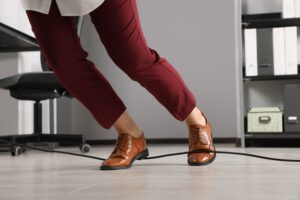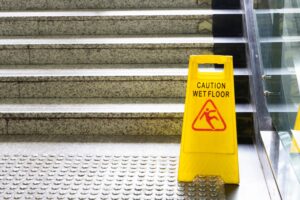If you have been injured in an accident at work, you may be looking for help and information on what to do after a workplace injury.
This blog post examines the various steps and actions you should take following a workplace accident. This includes potential steps you could take to help support you if you decide to pursue a personal injury claim. Additionally, we look at what defines employer negligence and who might have a legitimate claim for workplace injury due to a breach of health and safety legislation.
Furthermore, if you decide to pursue an accident at work claim, we look at how one of the No Win No Fee solicitors from our panel could help you. Simply connect with our advisory team on the following contact details to ask any questions you may have about the claims process:
- Call our team on 0330 043 2925
- Contact us online to receive a callback.
- Use our live chat to ask a question.
What To Do After A Workplace Injury
If you have been injured at work, you may be looking for information on what to do after a workplace injury. There a various steps that you can take after an accident at work, some of which we will examine below.
Additionally, some of the following steps could help support you in the future if you decide to pursue a personal injury claim. However, in order to have a valid case, you must ensure negligence occurred. This is when:
- You were owed a duty of care by your employer.
- They breached this duty, e.g. they provided you with no manual handling training.
- This caused you to suffer an injury, e.g. you suffered a back injury when trying to carry a load.
Your employer owes you a duty of care under the Health and Safety at Work etc. Act 1974 (HASAWA). It requires them to take reasonable and practicable steps to help prevent you from coming to harm while performing your work duties.
Following a workplace accident, some of the steps you could take include the following:
Make Sure You Get Medical Treatment
Obviously, it is essential to receive medical treatment after a workplace accident, however minor or severe your injuries may be. Depending on the type and severity of your injury, you may attend Accident & Emergency (A&E) or book an appointment with your GP. Additionally, depending on the severity of the injuries, it may be necessary for a colleague or passerby to call for an ambulance.
After this initial treatment, you could request a copy of your medical records. Your records should state the type of injury you suffered, what treatment you required and any on-going treatments you may need. These records could then be used as evidence to strengthen your potential workplace accident claim.
Report Your Workplace Injury To Your Manager
Any workplace injury should be reported to your manager as soon as possible, ensuring that you adhere to the organisation’s accident reporting procedures.
Any injury you suffered at work should be reported to your manager, regardless of how it occurred and whether anyone was liable. Additionally, your employer is legally obligated to report certain workplace accidents and injuries to the Health and Safety Executive (this is Britain’s regulatory body for workplace health and safety).
If you are unable to report the injury yourself at the time, a colleague could do this for you.
Ensure Your Accident Is Recorded In The Company Accident Book
Reporting an injury at work is very important. It is a legal requirement for workplaces of more than 10 employees to keep a company accident book on the premises at all times. This book should be used to record the time, date and nature of any accidents, along with the name(s) of the employees affected. It can also include details about what course of action was needed after the accident, for example, whether the employee needed to be taken to hospital.
Certain qualifying injuries also need to be reported by employers to the Health and Safety Executive (this is Britain’s regulatory body for workplace health and safety) under The Reporting of Injuries, Diseases and Dangerous Occurrences Regulations 2013 (RIDDOR). This ranges from multiple fractures at work to fatal accidents in the workplace.
You could request a copy of your accident report. This could then be used as evidence in your claim and provide crucial details on how and when the accident took place. Also, even if you didn’t report the accident, you could still make a personal injury claim, provided your case meets the eligibility requirements.
Take Photos and Video Evidence
If you are in a condition to do so, it’s useful to take photos and video footage of your injuries and the hazards that created them. For example, this could include a trailing lead or cable wire on the workfloor that you tripped over. You could also ask a colleague to take the pictures on your behalf if you are unable to.
In addition to this, most workplaces have CCTV footage in key areas. You are entitled to request copies of CCTV footage that includes you. Therefore it can be useful to request this from your employer. You could submit this footage as evidence of how your accident occurred and who was responsible.
Write A Diary of Your Symptoms
Whatever the exact nature of your injury, you may suffer a variety of physical and psychological symptoms. Some of these may present immediately, and some may be experienced later on.
With this in mind, it’s important to make a detailed note of symptoms both straight away and in the coming weeks or months.
For example, something heavy dropping on your foot at work can fracture a toe and create immediate pain and swelling. As time progresses, you may experience difficulty walking due to the fracture not healing properly, as well as depression due to being unable to work.
This symptoms diary could then be used to support your accident at work claim for how the injury has impacted your daily life.
Record Any Financial Losses You’ve Suffered
Any injuries you’ve suffered in the workplace may also impact your finances. For example, if you needed to take time off work due to suffering an arm injury, this could cause you to experience a loss of earnings.
Additionally, you may have had to pay for private medical treatments, travel to essential appointments and care at home.
You should keep a record of all of these financial losses and costs with documentation such as wage slips, invoices, receipts and bank statements. Without these records, you might not be able to claim any of these financial losses back as part of your compensation settlement.
For more information on what to do after a workplace injury or to check whether you may have a valid personal injury claim, you can contact our advisors.
Can I Make A No Win No Fee Accident At Work Claim?
You could launch a compensation claim with the help of one of the solicitors on our panel, provided you have an eligible case.
The solicitors on our panel have lots of experience dealing with various workplace accident claims. They could provide you with further guidance on what to do after a workplace injury. Additionally, they could help you with calculating the compensation owed to you and gathering evidence to support your case.
Furthermore, our panel of solicitors can support their client’s claim under a specific version of a No Win No Fee contract called a Conditional Fee Agreement (CFA). Under terms such as these, there are no initial fees needed to hire the solicitor, or any payments for their services as the case progresses. If the claim fails, no fees are required for completed solicitor’s services at all.
If a personal injury claim is successful, you will be awarded compensation. A limited percentage amount is deducted from this compensation as a success fee. This is subjected to a legal cap, ensuring the majority of the compensation stays with you.
To see whether you could work with a solicitor on our panel, or for further guidance on what to do after a workplace injury, you can contact our advisors:
- Call 0330 043 2925
- Contact us online.
- Use our live chat service.
More Resources About Claiming For Workplace Accidents
In addition to this guide on what to do after a workplace injury, these other resources might help:
- This guide explores slip and fall at work claims.
- Here we look at the average compensation for a fall accident at work claim.
- In addition to this, you can read about claiming for a psychological injury at work in this guide.
External help:
- Learn when you could be eligible for Statutory Sick Pay (SSP) from Gov.UK.
- Further guidance on what employers must do to help employees seek first aid from the Health and Safety Executive.
- Also, learn when to call 999 from the NHS.
We appreciate your interest in this blog post about what to do after a workplace injury. Connect with the team for any more assistance.






